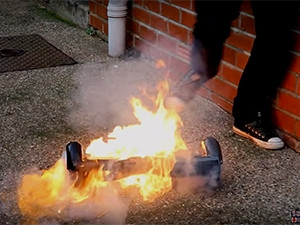
A British vlogger has captured the latest in a series of spontaneous hoverboard explosions rapidly giving the devices a dangerous reputation.
Stephen Leenott, who vlogs under screen name BuleBritish on YouTube, on Wednesday posted a video showing him un-boxing a brand new Smart Balance Wheel "hoverboard" (the devices more closely resemble electric skateboards). He places it on the ground and tentatively tests it with one foot. Instead of moving forward, the device hisses and smokes before suddenly bursting into flame.
Dozens of similar incidents have been reported over recent months, including a house fire in Melbourne, Australia that destroyed a family of five's home. The fire started when a hoverboard, left to charge for all of 10 minutes, rapidly caught alight.
Mystery menace
While hoverboards are obviously hazardous, experts remain inconclusive as to the reasons for this.
The most popular theory is that the fires originate from the highly-flammable lithium-ion batteries used in hoverboards. An Australian fire expert investigating the Melbourne fire said the device's battery had exploded.
Yet lithium-ion batteries have for years been established safe in other electronic devices, such as smartphones and laptops, and there is no common consensus as to why they are so unsafe in hoverboards.
Safety authorities in the US, UK and Australia have instructed users to avoid unmarked or uncertified chargers and charging cables, although several hoverboard fires have appeared unrelated to charging. In Auburn, Washington in early December, a hoverboard spontaneously erupted while it was standing at rest, unused and not being charged.
Unknown, or unregulated?
Authorities and retailers are also cautioning potential hoverboard-buyers to avoid unknown, cheap, or "knockoff" brands, reasoning these are less likely to be certified as safe.
Yet "mainstream" hoverboard brands have not been able to keep themselves from getting burnt. Big hoverboard name Swagway is being sued after one of its hoverboards exploded while charging in New York, damaging the user's home.
Cnet's Sean Hollister speculates that while trusted, certified brands of electronic devices such as smartphones have emerged over time, the dust has yet to settle around hoverboards, and as such it is difficult to determine which brands are trustworthy.
"Even the top hoverboard brands -- Phunkeeduck, IO Hawk, Swagway -- are ones you've probably never heard of, ones that sprang up out of nowhere to take advantage of the hoverboard craze," he reasons.
Additionally, little time has passed for safety regulation and accountability mechanisms to be built around these devices, which are unique enough to require their own standards, Hollister notes.
Share